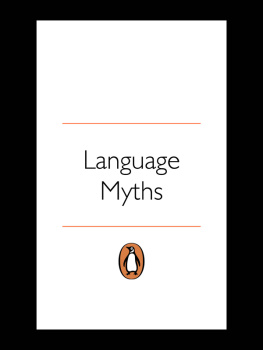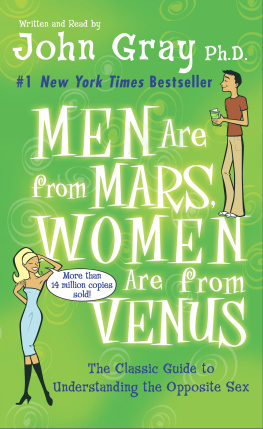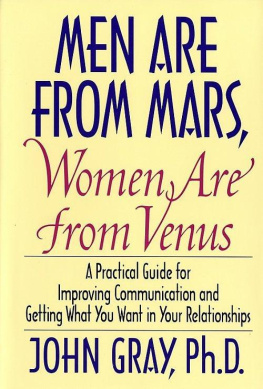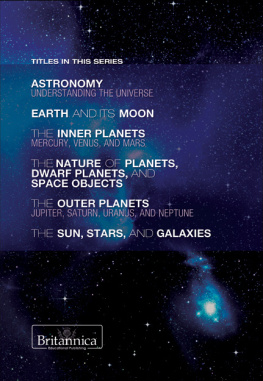Deborah Cameron - The Myth of Mars and Venus: Do Men and Women Really Speak Different Languages?
Here you can read online Deborah Cameron - The Myth of Mars and Venus: Do Men and Women Really Speak Different Languages? full text of the book (entire story) in english for free. Download pdf and epub, get meaning, cover and reviews about this ebook. year: 2007, publisher: Oxford University Press, genre: Science / Business. Description of the work, (preface) as well as reviews are available. Best literature library LitArk.com created for fans of good reading and offers a wide selection of genres:
Romance novel
Science fiction
Adventure
Detective
Science
History
Home and family
Prose
Art
Politics
Computer
Non-fiction
Religion
Business
Children
Humor
Choose a favorite category and find really read worthwhile books. Enjoy immersion in the world of imagination, feel the emotions of the characters or learn something new for yourself, make an fascinating discovery.
- Book:The Myth of Mars and Venus: Do Men and Women Really Speak Different Languages?
- Author:
- Publisher:Oxford University Press
- Genre:
- Year:2007
- Rating:3 / 5
- Favourites:Add to favourites
- Your mark:
- 60
- 1
- 2
- 3
- 4
- 5
The Myth of Mars and Venus: Do Men and Women Really Speak Different Languages?: summary, description and annotation
We offer to read an annotation, description, summary or preface (depends on what the author of the book "The Myth of Mars and Venus: Do Men and Women Really Speak Different Languages?" wrote himself). If you haven't found the necessary information about the book — write in the comments, we will try to find it.
The Myth of Mars and Venus: Do Men and Women Really Speak Different Languages? — read online for free the complete book (whole text) full work
Below is the text of the book, divided by pages. System saving the place of the last page read, allows you to conveniently read the book "The Myth of Mars and Venus: Do Men and Women Really Speak Different Languages?" online for free, without having to search again every time where you left off. Put a bookmark, and you can go to the page where you finished reading at any time.
Font size:
Interval:
Bookmark:
Reviews for The Myth of Mars and Venus
Cameron blows through the fog of pop-psych gender research like Afrin through swollen sinuses, shrinking the claims of sound-bite science on contact
Jan Freeman, The Boston Globe
a brilliant and timely book Katharine Viner, The Guardian
In this vigorously argued book, [Cameron] also combats the clich by example, writing in an enjoyable mode of
pugnacious sarcasm Steven Poole, The Guardian
this immensely readable book Romy Clark, Red Pepper magazine
This short and enjoyable read is very welcome
Sarah Ensor, Socialist Review
Camerons wry, measured dismemberment of these stereotypes makes for enjoyable reading
Ceri Radford, The Daily Telegraph
Think again, says Deborah Cameron. Her new book unpicks what she calls the Myth of Mars and Venus
Kenan Malik, The Sunday Telegraph
this delightfully spiky book
Susannah Herbert, The Sunday Times, Culture Magazine
interesting convincing acute observation
Ed Caesar, The Sunday Times, News Review
Online
terrific, myth-busting Stephanie West Allen, Brains on Purpose Fascinating, insightful, comprehensive youll just have to read it for yourself Contemporary UK Feminism
Cameron does a great job Feminist Philosophers
wonderfully refreshing Feminist Review
I can highly recommend the book Elizabeth Kelan, Lady Geek thought-provoking ideas on just about every page
Roy Johnson, Mantex
a real revelation and fascinating Brian Clegg, Popular Science Cameron cites a lot of literature, makes her points lucidly, and distinguishes nicely between scientific consensus and cultural assumption. Shes also bitingly funny
Read for Pleasure
Deborah Cameron


Great Clarendon Street, Oxford OX2 6DP
Oxford University Press is a department of the University of Oxford.
It furthers the Universitys objective of excellence in research, scholarship,
and education by publishing worldwide in
Oxford New York
Auckland Cape Town Dares Salaam Hong Kong Karachi
Kuala Lumpur Madrid Melbourne Mexico City Nairobi
New Delhi Shanghai Taipei Toronto
With offices in
Argentina Austria Brazil Chile Czech Republic France Greece
Guatemala Hungary Italy Japan Poland Portugal Singapore
South Korea Switzerland Thailand Turkey Ukraine Vietnam
Oxford is a registered trade mark of Oxford University Press
in the UK and in certain other countries
Published in the United States
by Oxford University Press Inc., New York
Deborah Cameron 2007, 2008
The moral rights of the author have been asserted
Database right Oxford University Press (maker)
First published 2007
First published as an Oxford University Press paperback 2008
All rights reserved. No part of this publication may be reproduced,
stored in a retrieval system, or transmitted, in any form or by any means,
without the prior permission in writing of Oxford University Press,
or as expressly permitted by law, or under terms agreed with the appropriate
reprographics rights organization. Enquiries concerning reproduction
outside the scope of the above should be sent to the Rights Deparment,
Oxford University Press, at the address above
You must not circulate this book in any other binding or cover
and you must impose the same condition on any acquirer
British Library Cataloguing in Publication Data
Data available
Library of Congress Cataloging in Publication Data
Data available
Typeset in 10.75/15pt Dante by Graphicraft Limited, Hong Kong
Printed in Great Britain by Clays Ltd, St Ives plc
ISBN 978-0-19-955099-9
The Myth of Mars and Venus has two related goals. One is to dispel some of the myths that currently surround the subject of malefemale differences in language and communication. The other is to put something in place of those myths, by making the relevant linguistic research accessible to a wider audience. Some of the research I have drawn on is my own, but much of it is the work of other language and gender scholars. Although they should not be held responsible for the views expressed in this book, it could not have been written without them, and I acknowledge my debt to them with thanks. I am particularly grateful to Penelope Eckert, Susan Ehrlich, Janet Holmes, Don Kulick, Fiona McAlinden, Sally McConnell-Ginet, Miriam Meyerhoff, Kathy OLeary, Momoko Nakamura, and Sylvia Shaw. I also thank Meryl Altman, Joan Scanlon, and Jane Taubman for their comments, suggestions, and general encouragement, and my editor Ben Harris for his patience.
Myths and Why They Matter
Do men and women speak the same language? Can they ever really communicate? These questions are not new, but since the early 1990s there has been a new surge of interest in them. Countless self-help and popular psychology books have been written portraying men and women as alien beings, and conversation between them as a catalogue of misunderstandings. The most successful exponents of this formula, writers like Deborah Tannen and John Gray, have topped the best-seller lists on both sides of the Atlantic. Advice on how to bridge the communication gulf between the sexes has grown into a flourishing multimedia industry. John Grays official website, for instance, promotes not only his various Mars and Venus books, but also seminars, residential retreats, a telephone helpline, and a dating service.
Readers who prefer something a little harder-edged can turn to a genre of popular science books with titles like Brain Sex, Sex on the Brain, The Essential Difference, and Why Men Dont This literature explains that the gulf between men and women is a product of nature, not nurture. The sexes communicate differently (and women do it better) because of the way their brains are wired. The female brain excels in verbal tasks whereas the male brain is better adapted to visual-spatial and mathematical tasks. Women like to talk, but men prefer action to words.
Writers in this vein are fond of presenting themselves as latter-day Galileos, braving the wrath of the political correctness lobby by daring to challenge the feminist orthodoxy which denies that men and women are by nature profoundly different. Simon Baron-Cohen, the author of The Essential Difference, explains in his introduction that he put the book aside for several years because the topic was just too politically sensitive. Both writers stress that they have no political axe to grind: they are simply following the evidence where it leads, and trying to put scientific facts in place of politically correct dogma.
Yet before we applaud, we should perhaps pause to ask ourselves: since when has silence reigned about the differences between men and women? Certainly not since the early 1990s, when the previous steady trickle of books began to develop into a raging torrent. By now, a writer who announces that sex-differences are natural is not saying the unsayable, he or she is stating the obvious. The proposition that men and women communicate differently is particularly uncontroversial, with clichs like men never listen and women find it easier to talk about their feelings referenced constantly in everything from womens magazines to humorous greeting cards. A few years ago, a British Telecom advertisement informed us that men like to conduct phone calls standing up, whereas women prefer to sit down. Even if this were a proven fact (which I doubt it is), the obvious response would be so what? But today we seem willing to treat even the most implausible and trivial claims as worthy of serious attention.
Next pageFont size:
Interval:
Bookmark:
Similar books «The Myth of Mars and Venus: Do Men and Women Really Speak Different Languages?»
Look at similar books to The Myth of Mars and Venus: Do Men and Women Really Speak Different Languages?. We have selected literature similar in name and meaning in the hope of providing readers with more options to find new, interesting, not yet read works.
Discussion, reviews of the book The Myth of Mars and Venus: Do Men and Women Really Speak Different Languages? and just readers' own opinions. Leave your comments, write what you think about the work, its meaning or the main characters. Specify what exactly you liked and what you didn't like, and why you think so.











